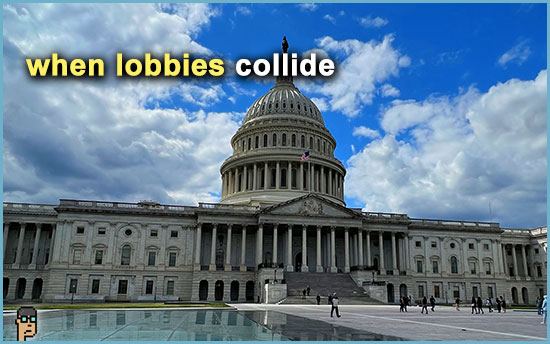battling lobbies
Better Markets, which is run by former senior Democratic Hill staffer Dennis Kelleher, who is considered by some as one of D.C.’s most influential people, is attracting attention from the blockchain lobby in DC as a House floor vote on key digital assets legislation beckons this fall.
Back on July 11, in a letter addressed to Chair Patrick McHenry (R, NC) and Ranking Member Maxine Waters (D, CA) of the House Financial Services (HFS) Committee and Chair Glenn “GT” Thompson (R, PA) and Ranking Member David Scott (D, GA) of the House Agriculture Committee, Kelleher expressed a list of reservations about the digital asset market structure bill which eventually became “Financial Innovation and Technology (FIT) for the 21st Century Act.”
Kelleher concluded at the time about the makings of the bill, “Unfortunately, the Discussion Draft would seem to be creating new market structures that are not well-regulated if regulated at all.” Read the 9-page letter.
battling lobbies – response
Yesterday, the Chamber of Digital Commerce’s Cody Carbone, who is a former Republican Hill staffer, addressed a letter to the same list of HFS and House Ag leaders, and took issue with Kelleher’s views including the involvement of the Commodity Futures Trading Commission in oversight of digital assets.
“The Letter’s claim that ‘Investor protection has been at the core of U.S. securities laws and regulations’ insinuates a unique proficiency for protection reserved solely for the SEC instead of shared by the CFTC. This perspective fails to acknowledge the breadth and depth of the CFTC’s mandates to promote market integrity and resilience,” writes Carbone. Read that one (PDF).
more tips:
Carbone tweeted on X yesterday:
“Fall HFSC hearings (tentative) to pay attention to:
9/14: Digital Asset Subcommittee Hearing on CBDCs
9/20: Hearing on Nat Sec with FinCEN
9/27: Hearing with SEC Chair Gensler”
anti-stablecoins
On Monday, in an op-ed in American Banker titled, “PayPal’s stablecoin plan poses a grave threat to financial stability,” George Washington University Law School professor Andrew Wilmarth updates his case against letting stablecoins into the U.S. financial system. “Stablecoins are highly vulnerable to runs by investors whenever there are doubts about the adequacy of their reserves. More than 20 stablecoins have failed since 2016. In May 2022, the collapse of the TerraUSD stablecoin inflicted tens of billions of dollars of losses on investors,” recalls Wilmirth. He sees PayPal’s recent stablecoin launch setting up a government bailout down the road à la SVB, Signature and First Republic. Read more.
Lobbyist Better Markets tweeted on X, “Why are proposals like PayPal‘s stablecoin plan so dangerous to our financial system? Arthur E. Wilmarth Jr. outlines the key issues that should be considered.”
more tips:
Comment Letter to the U.S. Treasury Department regarding the Risks of Stablecoins (2022) – Andrew Wilmarth, GW Law
emerging market crypto
Swiss-based Bank of International Settlements, a forum and bank for central banks, came out with a note yesterday on “financial stability risks from cryptoassets in emerging market economies.”
The report has several parts, but the last part crisply breaks down the agenda ahead for emerging market economies (EME) according to BIS: “Authorities can consider (selective) bans, containment and regulation.” Read the BIS summary. And, download the 51-page report (PDF).
When it comes to crypto assets, there remains a tension between inclusivity/addressing the unbanked and what this report sees as the threat of financial instability which collides with BIS’ central bank membership.
more tips:
Crypto has ‘amplified financial risks’ in emerging markets, central banks warn – The Financial Times
CBDC momentum
Cointelegraph covers the results of an annual global survey of banking industry executives by Citi’s Securities Services group. The reports notes the growing momentum for distributed ledger technology (DLT) and digital assets, and where that fits with securities professionals’ priorities.
“In this year’s survey, 52% of market participants expect CBDCs to be live within three years – providing a robust and scalable solution to the long-running question of how to store and transfer value on blockchains.” The survey participants included 483 members of Financial Market Infrastructures (FMIs), custodians, broker-dealers, investment managers and institutional investors. Download the report (PDF).
Cointelegraph summarizes the reports findings saying that “institutional investors, banks and asset managers have the greatest ability to scale and deliver marketwide solutions — a crucial determinant to the widespread adoption of CBDCs, stablecoins and other centrally governable financial instruments.” Read more.
coming this fall
“@GOPMajorityWhip is working to ensure that Congress strikes the right balance for the digital asset ecosystem that protects consumers and fosters innovation.” (August 22) – House Financial Services Republicans
crime blotter
FBI says North Korean hackers preparing to cash out after high-profile crypto hacks – TechCrunch
Ex-OpenSea Manager Sentenced for NFT Insider Trading – Unchained
Binance, the Biggest Player in Crypto, Is Facing Legal Risks Over Russia – The Wall Street Journal
still more tips
Coin Center Suggestions to Address Uncertain Tax Treatment of Digital Assets (August 21) – CoinCenter
Crypto Tax Guidance Confusion Heralds Court Battles to Come – Bloomberg Tax
Some rough impressions of Worldcoin (August 21) – Matthew Green
New post-quantum cryptography guidance offers first steps toward migration – NextGov.com

